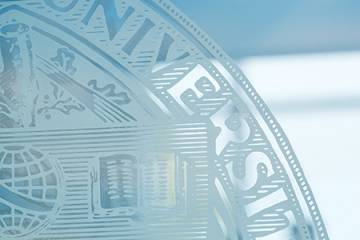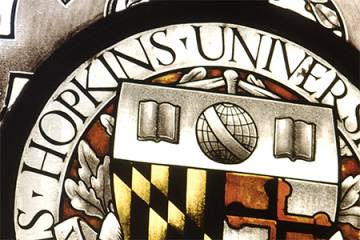Johns Hopkins University has adopted a series of new universitywide policies designed to improve PhD education and ensure that PhD students have access to opportunities for structured professional and academic guidance.
The policies—which outline mentorship expectations, require annual meetings for students to review their progress with advisers, and lower the time-to-degree limit to nine years—were developed by an interdivisional faculty working group, then reviewed and passed by the Doctor of Philosophy Board, a group of faculty and student representatives from across the university who set guidelines and priorities for enhancing the PhD student experience.
"Over the last three years, the Doctor of Philosophy Board has reviewed PhD programs with the goal of improving the quality of PhD training and education universitywide," says Juliette Lecomte, a professor of biophysics who chaired the board while it developed the new policies. "The policies were written in consultation with PhD-granting schools, and they incorporate recommendations from an interdivisional working group. The board believes that these policies will improve the experiences of all PhD students. The implementation is one step toward ensuring that JHU remains at the forefront of doctoral education."
The mentorship policy codifies the expectations and commitments of PhD students and their advisers. It requires that every division—and in some cases individual departments—enact strategies that support mentorship. Every school also is required to appoint a staff or faculty member who can serve as an advocate for students who have concerns about their mentors.
Elliot Wainwright, a PhD student in materials science and engineering, represents the Graduate Representative Organization on the universitywide PhD Student Advisory Committee and helped review drafts of the new policies. He says he expects the mentorship policy to make an immediate and lasting impact on PhD students.
"When you think about it, the mentor/mentee relationship is one of the biggest contributors to the student experience for PhD students," he says. "Anything that sets expectations of that relationship in advance and lays out for faculty and students a mutual agreement regarding what the parties can do for each other is a great step in the right direction."
Peter Espenshade, a professor of cell biology and associate dean for graduate biomedical education at the School of Medicine, served on the working group that developed the policies, as well as on the Doctor of Philosophy Board. He says the policy protects the interests of both students and their faculty mentors by setting forth standards of practice and providing resources.
"Hopkins faculty provide outstanding training for PhD students. However, the reality is that faculty and students are incredibly busy, and structured mentorship can sometimes take a back seat to the excitement and demands of research," he says. "This policy not only explains what the mentor/mentee relationship should look like but will also generate resources for advisers and students to optimize that relationship."
The professional development policy further expands what is expected of faculty mentors and advisers by requiring annual meetings between students and advisers to discuss three important topics: the student's academic progress and goals; the student's professional progress and goals; and how the adviser can support both. The policy provides a sample conversation prompt so that all three requirements of the conversation are met. The goal, Espenshade says, is for students to think strategically about their careers and the professional skills they'll need from the start of their PhD program.
The mentorship and professional development policies grew out of recommendations outlined in a report published last fall by the Johns Hopkins Committee on the Biomedical Scientific Workforce. That report, requested by Johns Hopkins University President Ronald J. Daniels and Provost Sunil Kumar, suggested strategies for countering nationwide challenges faced by the biomedical and scientific community. The interdivisional working group then adapted the committee's recommendations to apply to all disciplines at Johns Hopkins.
"Hopefully students see the obvious benefits of these policies," Wainwright says. "So much of the graduate student experience is built around relationships with mentors and advisers, and these two policies alone will have a significant impact on students' well-being at Hopkins and beyond."
A third new policy lowers the maximum time to PhD from 12 to nine years, bringing Johns Hopkins in line with peer institutions and ensuring that students complete their coursework and research in a timely fashion. The 12-year maximum remains in effect, however, for students who were enrolled before the 2019-20 academic year, and all students will still be able to request exceptions to the time-to-degree requirement.
"It's in everyone's interest for students to graduate in a timely manner, especially at a research institution where many fields change rapidly," Espenshade says. "Nine years provides sufficient time to complete the degree without impinging on academic exploration."
Nancy Kass, vice provost for graduate and professional education at Johns Hopkins, says the committee's work supports the university's academic and research mission.
"Graduate and PhD students are very much at the heart of the university's deep commitment to research and to supporting students' well-being and growth throughout their research work," Kass says. "By standardizing these policies across the university, we help to ensure that our students—no matter their field of study—have people they can speak with about their work and their goals as they complete their remarkable individual scholarship."
Posted in University News
Tagged phd, graduate education










